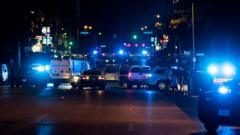Will Memphis Be the Next City to Deploy National Guard Troops?

Published: 2025-09-12 17:49:12 | Category: technology
In a significant escalation of his response to urban crime, President Donald Trump has announced the deployment of National Guard troops to Memphis, Tennessee. This decision comes as part of his ongoing strategy to address crime in Democrat-led cities, with the Memphis mayor reportedly supportive of the move. The announcement highlights the growing concern over crime rates in Memphis, which currently has one of the highest violent crime rates in the US.
Last updated: 22 October 2023 (BST)
Key Takeaways
- Trump has announced National Guard deployment to Memphis in response to high crime rates.
- The city's mayor, Paul Young, is reportedly supportive of federal assistance.
- Memphis has a violent crime rate of 2,501 per 100,000 people, one of the highest in the country.
- The National Guard was previously deployed in Washington DC, with ongoing operations there.
- Legal experts have raised concerns about military involvement in civilian law enforcement.
The Context of Crime in Memphis
Memphis has been grappling with a persistent crime issue, particularly violent crime. According to the FBI, the city recorded a staggering 2,501 violent crimes per 100,000 residents, making it a focal point for federal intervention. The rising crime rates have led local officials to seek additional support, which they believe could help bolster police efforts.
Trump's Announcement and Local Response
During an interview on Fox News Channel's Fox and Friends, President Trump stated, "We're going to Memphis," highlighting his intention to send National Guard troops to assist local law enforcement. He indicated that both the mayor and the state governor are pleased with the decision, although specific details regarding the timeline for troop deployment have not been disclosed.
Mayor Paul Young has actively engaged with the Trump administration regarding the need for federal resources to combat crime in the city. In a statement, he emphasised the importance of financial support for intervention and prevention efforts, as well as additional patrol officers to enhance police presence. Young stated, "Memphis is already making measurable progress in bringing down crime, and we support initiatives that help accelerate the pace of the work our officers, community partners, and residents are doing every day."
Comparative Analysis: Memphis and Other US Cities
Trump's focus on Memphis is part of a broader strategy that has seen similar actions in other urban areas. Notably, he has made references to deploying the National Guard to cities like Baltimore, Chicago, and New Orleans. Chicago has been a particular point of interest, with speculation surrounding whether it would receive troops next.
Statistics on Violent Crime in Major US Cities
Here's a brief overview of violent crime rates in some major cities, illustrating the challenge faced by local authorities:
- Memphis, TN: 2,501 violent crimes per 100,000 residents.
- Chicago, IL: 927 violent crimes per 100,000 residents.
- New Orleans, LA: 1,194 violent crimes per 100,000 residents.
- Baltimore, MD: 1,858 violent crimes per 100,000 residents.
These figures highlight the varying degrees of crime across the nation and underscore the complexities local governments face in managing public safety. While Memphis has been identified as the next target for assistance, other cities continue to deal with their own pressing crime issues.
Ongoing Operations in Washington DC
Trump's recent actions follow a prior deployment of the National Guard to Washington DC. This operation commenced on 11 August, when Trump took control of the Metropolitan Police Department (MPD). Following a 30-day period of heightened security and numerous arrests, the White House claimed significant improvements in public safety, stating that DC is now "virtually crime free."
Despite the conclusion of the initial deployment, National Guard troops are expected to remain in the nation's capital, assisting with various duties, including sanitation efforts like trash collection and mulching. The continued presence of troops in DC raises questions about the long-term implications of militarised law enforcement.
Legal Concerns and Public Debate
The use of National Guard troops to support local law enforcement has sparked legal and ethical debates. Legal experts have expressed concerns about the appropriateness of deploying military personnel in civilian contexts, especially given the potential for escalated tensions between law enforcement and communities.
A recent court ruling indicated that a previous deployment of National Guard troops to Los Angeles was deemed unlawful, although this ruling does not affect Trump's current plans for Memphis or other cities. The nuances surrounding the legalities of such deployments continue to be scrutinised, raising important questions about the balance of power between federal and local authorities.
What Happens Next?
As the situation in Memphis unfolds, it remains to be seen how the local administration will integrate the National Guard's presence into its crime-fighting efforts. The success of this initiative may depend on effective coordination between federal and local agencies, as well as community engagement to address root causes of crime.
Moreover, the implications of Trump's decision extend beyond Memphis. The potential for similar actions in other cities could reshape the landscape of urban crime response and the role of federal intervention in local law enforcement.
Conclusion
President Trump's deployment of National Guard troops to Memphis marks a pivotal moment in his administration's approach to urban crime. The decision has elicited mixed reactions, with local officials welcoming the support while broader concerns about the militarisation of policing continue to simmer. As cities across the US face their unique challenges, the outcomes in Memphis may set a precedent for future federal involvement in crime control strategies.
How effective will the National Guard be in addressing the challenges faced by Memphis? As this situation develops, the nation's eyes will be on the city and its leaders to see if this intervention yields the desired results. #Memphis #NationalGuard #UrbanCrime
FAQs
Why is the National Guard being deployed to Memphis?
The National Guard is being deployed to Memphis to assist local law enforcement in addressing the city's high rates of violent crime, which are among the highest in the US.
What are the crime statistics for Memphis?
Memphis has a violent crime rate of 2,501 per 100,000 residents, significantly higher than many other major US cities.
What has the mayor of Memphis said about the National Guard deployment?
Mayor Paul Young expressed support for the deployment, stating that federal resources are needed to bolster local efforts to combat crime and enhance police capabilities.
What are the legal implications of using the National Guard for law enforcement?
The use of National Guard troops in civilian law enforcement raises legal and ethical concerns, with debates about the appropriateness of military involvement in policing and the potential for escalated tensions.
What other cities have been mentioned for National Guard deployment?
Other cities mentioned for potential National Guard deployment include Chicago, Baltimore, and New Orleans, as part of Trump's broader strategy to address crime in Democrat-led urban areas.



